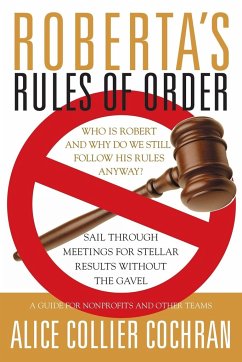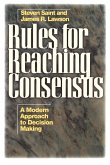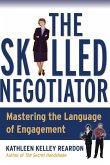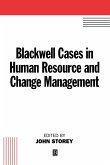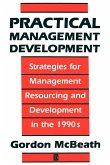Who is Robert and why do we still follow his rules anyway? This one-of-a-kind book challenges nonprofit leaders (and anyone who runs meetings) to retire Robert's Rules of Order and adopt a simpler, friendlier, and more effective method for conducting meetings-Roberta's Rules of Order. Using traditional sailing ships as a metaphor, meetings and governance expert Alice Collier Cochran helps groups make the journey from the "shore" that represents the culture of Robert's Rules-procedural formality, debate, simple majority rule-to the opposite "shore" of Roberta's Rules-informality, dialogue, and decision-making options. In doing so, she helps them to conduct friendlier, more effective meetings and to take the first step toward creating flexible, democratic organizations. Cochran outlines practical principles for effective meetings and governance. She shows leaders a new way to run effective meetings, improve the way their organizations are governed, and more successfully achieve their mission and goals.
Reviewed by: Stephen C. Nill, J.D., CEO CharityChannel
Anyone who has ever participated in nonprofit board meetingsthat were governed by Robert's Rules of Order will not be surprisedto learn of the military background of its author: U.S. ArmyGeneral Henry M. Robert. The rules make a good deal of sense tothose who love rigid structure, and rules, rules, rules. Aftersitting on nonprofit boards and serving as legal counsel tononprofit organizations for more than two decades, I have come toloathe Robert's Rules of Order. I've seen how these rules oftenstifle meaningful dialog and problem-solving by giving advantage tosome while relegating others to the sidelines. Indeed, they rarelycoax a full contribution from those who are naturally quiet andthoughtful, or who hold back because of a lack of standing insociety and/or within the board itself. It is this latter failingthat cuts against the grain of our sector--a sector that soobviously values, and draws strength from, full participation fromthose of diverse views.
Thus it was with great interest that I learned of the bookprovocatively titled Roberta's Rules of Order, by Alice CollierCochran. I was so taken by the book that I spent a half-hour or soon the phone with its engaging author, talking about her motivationfor writing the book, what she wanted to accomplish with it, and soon. You can listen to our discussion, part of the CharityChannel WEINTERVIEW series, at http://charitychannel.com/weinterview/archive/021.htm.
Cochran succeeds in what she sets out to do: Provide a lessformal, more feminine, and flexible approach. She replacesformality with informality; strict rules with guidelines andagreements; parliamentary procedure with democratic principles andprocesses; language of the 1800s with that of today; militaryterminology with civilian terminology; one-size fits all withflexibility, by culture; a framework designed for English andEuropean males with that for a pluralistic society; win-lose votingwith win-win decisions; a decision between two choices with strawpolls and multiple choices; highly controlled and constrainedmeetings with those that are relaxed; and complicated with simple.I've saved perhaps the two greatest contributions for specialmention: Roberta's Rules of Order replaces debate with dialog, andshe puts the motion AFTER a discussion of the problem and itssolution, where it belongs.
While the author wants us to know that the concepts andprocesses she presents are not new--she gives ample credit where itis due--she should have no reluctance to take credit for putting itall together into a very well-written, easy-to-understand,fast-reading book. She uses a sailing metaphor to good advantagethroughout.
I do not overstate it when I say that this book is perhaps oneof the most important contributions to the third sector I haveseen. If board meetings could really become warm, easy, productiveand effective, imagine how that would strengthen the organization!I intend to put it into the hands of board members on every board Iserve on or advise.
Anyone who has ever participated in nonprofit board meetingsthat were governed by Robert's Rules of Order will not be surprisedto learn of the military background of its author: U.S. ArmyGeneral Henry M. Robert. The rules make a good deal of sense tothose who love rigid structure, and rules, rules, rules. Aftersitting on nonprofit boards and serving as legal counsel tononprofit organizations for more than two decades, I have come toloathe Robert's Rules of Order. I've seen how these rules oftenstifle meaningful dialog and problem-solving by giving advantage tosome while relegating others to the sidelines. Indeed, they rarelycoax a full contribution from those who are naturally quiet andthoughtful, or who hold back because of a lack of standing insociety and/or within the board itself. It is this latter failingthat cuts against the grain of our sector--a sector that soobviously values, and draws strength from, full participation fromthose of diverse views.
Thus it was with great interest that I learned of the bookprovocatively titled Roberta's Rules of Order, by Alice CollierCochran. I was so taken by the book that I spent a half-hour or soon the phone with its engaging author, talking about her motivationfor writing the book, what she wanted to accomplish with it, and soon. You can listen to our discussion, part of the CharityChannel WEINTERVIEW series, at http://charitychannel.com/weinterview/archive/021.htm.
Cochran succeeds in what she sets out to do: Provide a lessformal, more feminine, and flexible approach. She replacesformality with informality; strict rules with guidelines andagreements; parliamentary procedure with democratic principles andprocesses; language of the 1800s with that of today; militaryterminology with civilian terminology; one-size fits all withflexibility, by culture; a framework designed for English andEuropean males with that for a pluralistic society; win-lose votingwith win-win decisions; a decision between two choices with strawpolls and multiple choices; highly controlled and constrainedmeetings with those that are relaxed; and complicated with simple.I've saved perhaps the two greatest contributions for specialmention: Roberta's Rules of Order replaces debate with dialog, andshe puts the motion AFTER a discussion of the problem and itssolution, where it belongs.
While the author wants us to know that the concepts andprocesses she presents are not new--she gives ample credit where itis due--she should have no reluctance to take credit for putting itall together into a very well-written, easy-to-understand,fast-reading book. She uses a sailing metaphor to good advantagethroughout.
I do not overstate it when I say that this book is perhaps oneof the most important contributions to the third sector I haveseen. If board meetings could really become warm, easy, productiveand effective, imagine how that would strengthen the organization!I intend to put it into the hands of board members on every board Iserve on or advise.
